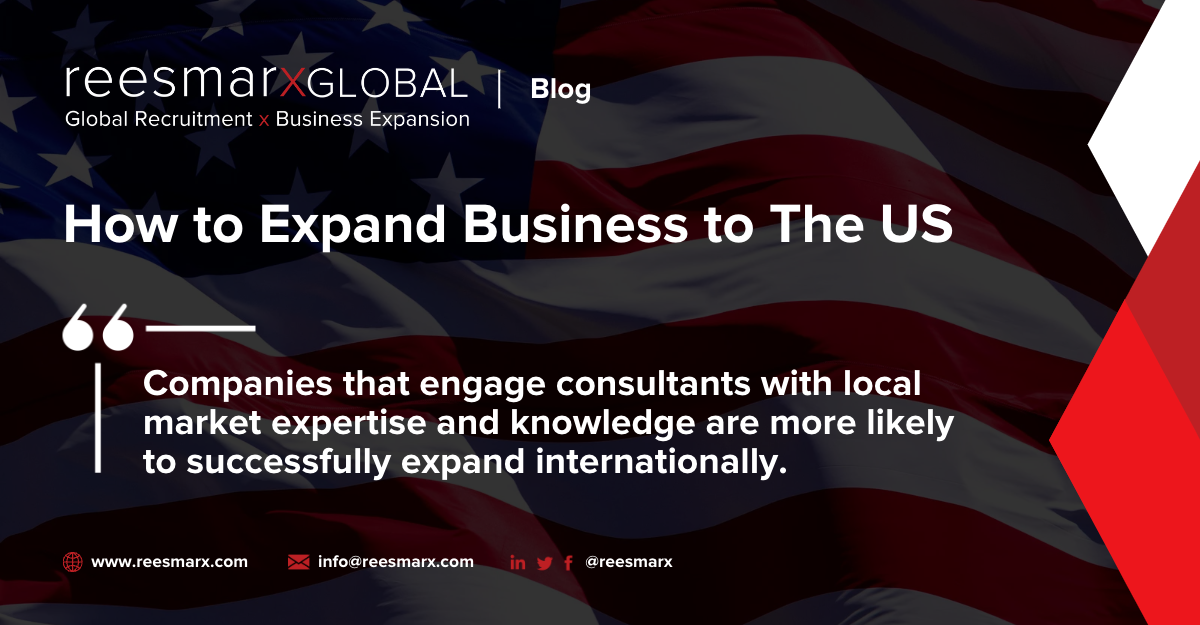Are you thinking about growing your company and establishing a global footprint? Businesses that successfully expand and grow tend to outperform their competitors in terms of profitability and market share, according to the National Bureau of Economic Research (NBER).
They gain a competitive advantage by expanding their customer base, product offerings, and geographical reach. And according to a study by McKinsey, companies that actively pursue business expansion strategies experience an average revenue growth rate of 8.3% annually, compared to 0.8% for companies that maintain a static approach. In short, expansion is very good for business.

Expanding a business to any new market requires careful research, planning, and adaptation to local regulations and market dynamics. However, for many companies, the advantages offered by the United States make it a top attractive destination for business expansion.
Several companies have recently expanded to the United States and achieved global success. In the past decade, Alibaba, Spotify, and Canva are just a few that have experienced rapid growth and have become globally recognized brands with millions of users worldwide.
By expanding business to a land with the world’s largest consumer market, infamous economic stability, a thriving innovation ecosystem, and a business-friendly environment, companies of all sizes have shown that the United States offers a gateway to success on a global scale.
But the tricky question is, “How does a company successfully expand to the US?”
Whether you’re a startup, a small business, or an established corporation, expanding a company to the United States requires careful planning and execution. Here are some tips to consider for expanding your business to the USA:

Conduct Market Research
Thoroughly research the highly diverse US market, including consumer behavior, competition, cultural nuances, and legal/regulatory requirements. Understand your target audience and adapt your business strategy accordingly.
Insight: A study published in the Journal of Marketing emphasizes that conducting market research enables companies to make informed decisions about product development, pricing, distribution, and marketing strategies specific to the target market.
Develop a Business Plan
Create a comprehensive business plan that outlines your expansion strategy, goals, target market, marketing approach, and financial projections. This plan will serve as a roadmap for your expansion efforts.
Seek Professional Advice
Consider consulting with professionals knowledgeable about the US market, such as lawyers, accountants, recruitment agencies, economic development organizations (EDOs), and business advisors. They can guide the legal, financial, and operational aspects of expanding your business to meet your export, investment, and strategic growth objectives.
Insight: According to a study published in the Journal of International Business Studies, companies that engage consultants with local market expertise and knowledge are more likely to successfully expand internationally.
Adapt to Local Regulations
Familiarize yourself with US business laws, regulations, and compliance requirements. Ensure your business operations align with local laws, including tax regulations, employment practices, and licensing requirements.
Insight: The United States offers a favorable business environment with relatively streamlined processes for starting and operating a business. According to the World Bank’s Ease of Doing Business Index 2020, the United States ranked 6th out of 190 countries, indicating its business-friendly regulations and infrastructure.

Establish Local Partnerships
Building relationships with local partners, suppliers, distributors, or agents can help navigate the US market more effectively. Local partners can provide valuable insights, resources, and networks to support your business expansion.
Insight: According to a study conducted by McKinsey & Company, companies that actively engage in strategic partnerships when expanding internationally have a higher likelihood of achieving success. The study found that businesses that form partnerships with local companies or stakeholders experienced a 30% higher success rate in their international expansion efforts than those that pursued expansion solely through organic growth or acquisitions.
Consultants often have an extensive network of contacts and connections in the target market. According to a study conducted by the European Journal of International Management, leveraging the consultant’s network can help identify potential local partners, suppliers, distributors, or clients, facilitating market entry and establishing valuable business relationships.
Tailor Your Marketing and Branding
Adapt your marketing strategies and messaging to resonate with the US market. Consider cultural differences, language preferences, and consumer behavior patterns. Customize your branding and marketing materials to appeal to US consumers.
Insight: Research published in the Journal of International Marketing highlights the importance of cultural adaptation when expanding business abroad. Consultants can provide guidance on cultural nuances, etiquette, and business practices, enabling companies to tailor their strategies, communication, and product offerings to align with local cultural expectations.
Establishing a presence in the USA can enhance a company’s brand reputation and credibility on a global scale. Studies have shown that consumers often associate certain countries with specific attributes or qualities, which can influence their perceptions of brands originating from those countries. The “Made in USA” label is often associated with quality, innovation, and reliability, which can positively impact a business’s image and attract domestic and international customers.

Understand Customer Preferences
Study consumer preferences, trends, and buying behaviors in the US market. Adapt your product/service offerings, pricing, packaging, and customer support to meet the specific needs and expectations of US customers.
Insight: According to a report by the Selig Center for Economic Growth, the combined buying power of ethnic minority groups in the United States was estimated at $4.2 trillion in 2020. Businesses that understand and cater to these diverse communities’ specific needs and preferences can tap into significant market opportunities.
Build a Strong Online Presence
Establish a compelling online presence through a user-friendly website, social media engagement, and e-commerce capabilities. Leverage digital marketing strategies to reach your target audience and build brand awareness.
Insight: According to Statista, as of January 2021, over 4.8 billion people worldwide were active internet users. Building a strong online presence allows you to reach a vast global audience and expand your customer base beyond geographical boundaries.
E-commerce has experienced significant growth in recent years, especially due to the COVID-19 pandemic. According to eMarketer, global retail e-commerce sales reached $4.28 trillion in 2020 and are projected to continue growing.
Invest in Customer Service
Provide exceptional customer service to differentiate your business and build customer loyalty. Respond promptly to inquiries, address customer concerns, and prioritize customer satisfaction.
Insight: Research conducted by Frost & Sullivan highlights the importance of cultural adaptation and localization of customer service for successful international expansion. Customers in different countries have unique expectations and preferences regarding service quality, communication styles, and problem resolution. Investing in customer service that is tailored to the local culture and language can improve customer satisfaction, strengthen brand perception, and foster customer loyalty in the new market.
Hire Local Talent
Consider hiring local talent who deeply understand the US market and culture. Local employees can help you navigate the business landscape, establish relationships, and better serve your US customers.
Insight: Local employees possess valuable market knowledge and insights specific to their country or region. Research published in the Journal of World Business suggests that hiring local talent helps companies gain a deeper understanding of the target market’s cultural dynamics, customer preferences, and business practices. This knowledge can inform strategic decision-making, marketing strategies, and product localization efforts.

Adapt to Time Zones and Communication
Account for time zone differences when coordinating with partners, suppliers, or customers in the United States. Be responsive and ensure effective communication channels are in place to maintain efficient operations.
Stay Agile and Flexible
Be open to adapting your strategies based on market feedback and changing circumstances. Continuously monitor market trends, competition, and customer feedback to refine your business approach.
In the dynamic world of business, seizing the right opportunities can make all the difference. By expanding your business to the United States, you are choosing a path that leads to unparalleled growth and international recognition. The United States beckons with its promise of a thriving market, economic stability, and a supportive ecosystem that fuels innovation and entrepreneurship. Embracing the diverse landscape and tapping into the vast buying power of communities, your company can flourish and thrive on a global scale.
But expanding a business to the United States requires careful planning, cultural adaptation, and a deep understanding of the target market. By following these tips and remaining agile, you can increase your chances of successful expansion into the US market.
How We Can Help
Let us become your global business expansion and talent acquisition partner.
reesmarxGLOBAL places talented leadership and executives across all disciplines worldwide. Our experienced and dedicated talent acquisition teams expedite your global business expansion.






